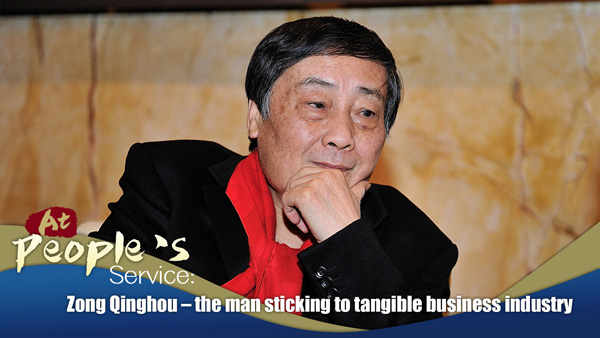zong qinghou – the man sticking to tangible business industry

even in a country that has exploded with wealth, zong qinghou, a member of the communist party of china and founder of china's largest beverage company wahaha, is still seen as one of the icons of chinese entrepreneurship.
his rags-to-riches tale has not only inspired generations of chinese to start their own businesses but also stimulated important changes in china's reform. now in his late 70s, he is still working get to know the new generation of customers, and find ways to innovate the real and tangible sector.
born in 1945, zong didn't venture into business until 1987, when he was in his 40s.
"i was assigned by the bureau of education to be the sales department's manager, it offered me a chance to do some business," zong recalled. "individuals were not allowed to start their own business or conduct private businesses at that time."
in 1989, zong founded a nutritional food factory named wahaha. its nutritional drinks for children became a national hit.
now private businesses are a significant pillar of china's economy, but 30 years ago, in the early stages of china's reform and opening-up, things were complicated when it came to the relationship between private firms and state-owned enterprises.
that's why when he moved to acquire a state-owned canned food factory that was on the verge of bankruptcy in 1991, and launched wahaha group, it sparked a national uproar.
shen zheshou, then secretary general of the standing committee of the hangzhou municipal party committee, said the takeover was a colossal blow to state-owned enterprises. "some people even called it revisionism and a 'peaceful evolution'," shen recalled.
"at that time, state-owned enterprises had many benefits. it was totally unacceptable to see a private company trying to acquire us," said chen gangqiang, a former employee of the state-owned canned food factory.
"my intention was to save the state-owned company, not to destroy it," he said.
it didn't take long for zong's pledges of better pay to come through. chen, who later joined wahaha group, said, "i felt so surprised when i got a 370-yuan (around $58) bonus. it was an enormous figure at that time."
"many people called me a fool to shoulder such a big burden. but i felt that this was a milestone for my company. it was my first step to follow the reform and opening-up trend," said zong.
his bold and controversial move led to the nation's legalization of private acquisitions. china's socialist market economy has been at the heart of the nation's economic transformation. now china's private sector contributes more than 60 percent of the nation's gdp growth, and generates over half of its fiscal revenue. meanwhile, 80 percent of urban workers work for private firms.
though forbes magazine named him "the richest man in china" in 2010, 2012 and 2013, zong aims to retain a simple and thrifty life. it's common to see him dressed in a traditional chinese jacket and plain black shoes … all made in china.
"people who get rich early should help the rest get rich," he said, referring to words attributed to the late chinese leader deng xiaoping. "i was born in 1945, i was raised taking my lead from the cpc and worked my way up during hard times, so i think the ultimate goal of an entrepreneur is to fulfill his responsibility for society and create wealth for the country and the people."
today's business world is very different from when zong first tasted success, but he's keen to catch up with new generations born in a more diverse and much more developed country.
yet, the tycoon insists what matters most for china is still the real and tangible economy, which is the foundation for the country.
-
'nice' to meet you, hangzhou
may 6, 2024

